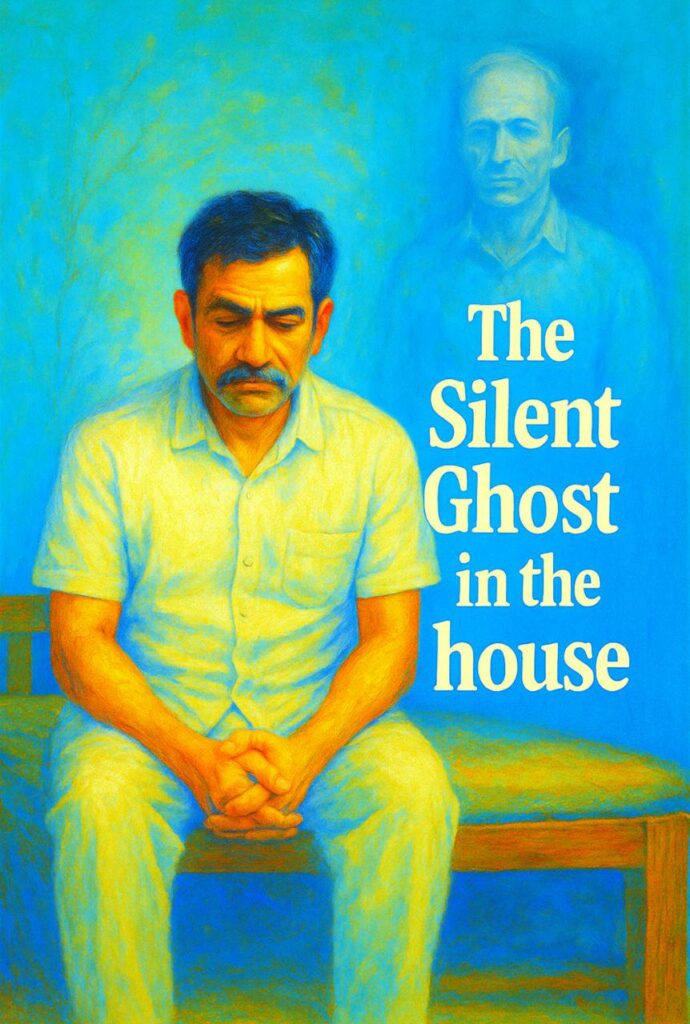How the emotional disconnect between Indian youth and fathers is creating a hidden mental health crisis among the very men who sacrificed everything for love.

At 3 AM, Rajesh sits on his terrace, scrolling through his daughter’s Instagram posts; the only way he can glimpse her life now. She lives just 150 kilometers away, barely a three-and-a-half-hour drive, but the emotional distance feels infinite. The irony is suffocating: the man who once knew her every thought, every fear, every dream, is now reduced to being a digital stalker of his own child. This isn’t the story of an abusive father facing consequences. This is the story of a man whose crime was loving too much, caring too deeply, and daring to believe that modern fatherhood meant emotional intimacy.
Across India’s middle-class homes, a silent epidemic is unfolding. Fathers, men who redefined their entire approach to parenting, who became friends instead of dictators, are collapsing under the weight of a rejection they never saw coming.
The Ghost Protocol: From Hero to Haunting
For decades, Indian fathers operated within a clear framework. Authority was unquestioned, communication was formal, and emotional distance was not just acceptable; it was expected. The fear that exists between the father and the children affects the sons and the daughters differently, but it was a familiar fear, predictable in its patterns. Fathers knew their place: provider, protector, disciplinarian.
Then came the shift. Suddenly, these same fathers were told to become friends with their children. Modern parenting advice flooded in: “Be approachable. Listen to your children. Show emotions. Be vulnerable.”
“Fathers today spend more than triple the time with their children daily compared to dads in the 1970s. Indian fathers, ever the dutiful providers, embraced this new mandate with the same dedication they once brought to earning money.”
They learned to ask about their children’s day. They attended parent-teacher meetings with newfound enthusiasm. They tried to understand teenage slang, navigated social media to stay connected, and opened their hearts in ways their own fathers never had. Many believed they were building bridges to a closer relationship with their children.
But somewhere in this transformation, a cruel irony emerged. The very intimacy they cultivated became the weapon that would wound them most deeply. The ghost protocol had begun—the systematic process of turning living, breathing fathers into invisible presences in their own homes.
When Love Letters Turn into Death Warrants
Research in family psychology reveals that sustained caregiving creates deep neurological pathways associated with attachment and purpose. When these bonds are suddenly severed, the psychological impact mirrors that of bereavement. For Indian fathers who spent decades becoming emotionally invested in their children’s lives, rejection doesn’t just hurt—it devastates.
Consider Rakesh, a 52-year-old software engineer from Bangalore. For twenty years, he was his daughter’s confidant. He knew her friends, her crushes, her academic struggles. When she turned twenty-one and announced she was moving abroad for higher studies, cutting off contact because she felt “suffocated” by his involvement, Rakesh experienced what he describes as “feeling like someone had died.”
His case is not unique. Aging parents struggle to remain relevant amid cultural shift toward nuclear family, particularly fathers who invested emotionally in ways previous generations never did. The very closeness they worked to build becomes their vulnerability. The ghost protocol transforms devoted fathers into emotional phantoms, present in body, absent in recognition.
The Father’s Paradox: Too Close to Live, Too Far to Love
Modern Indian fathers find themselves trapped in an impossible paradox. The traditional father, distant but respected, maintained his authority through emotional unavailability. When children challenged him, the pain was limited because the relationship itself was limited. Where there’s fear, there’s no love. Love cannot and will not exist in a place where there’s fear, but neither can deep heartbreak.
Today’s involved fathers, however, have made themselves vulnerable in ways that have no cultural precedent. They’ve shared their struggles, celebrated their children’s victories as their own, and invested their emotional well-being in relationships that their children can now weaponize. When a son tells his father, “You don’t understand me” or a daughter declares, “I need space from your toxicity,” the blow lands with the force of intimate betrayal.
Dr. Suniti Solomon’s research on toxic masculinity reveals that men are expected to be strong, stoic, and emotionally unflinching. Crying is reserved for Bollywood heroes after a dramatic climax, not for the average bloke navigating deadlines, family expectations, and heartbreaks. Yet these fathers are experiencing exactly that heartbreak at a level they were never equipped to process. The ghost protocol ensures their pain remains invisible, their suffering unacknowledged.
Ghost Stories: The Science of Fatherly Disappearance
The neurobiological impact of paternal rejection is profound yet understudied. Long-term prospective longitudinal studies show that father involvement in childhood creates lasting physiological and behavioural consequences that span almost 30 years. But what happens when this involvement is suddenly rejected?
Recent research suggests that fathers who experience sustained emotional rejection from their children show patterns similar to those found in grief disorders. Parents who have unresolved emotional issues or past traumas may struggle to connect empathetically with their children, but the reverse is equally true: fathers who lose emotional connection with their children develop new traumas that manifest as depression, anxiety, and physical health problems.
The ghost protocol operates at a cellular level, rewiring the brain that once found purpose in paternal connection. These men become living phantoms, biologically altered by love lost, neurologically haunted by memories of intimacy that their children now reject.
Research in family psychology reveals that sustained caregiving creates deep neurological pathways associated with attachment and purpose. When these bonds are suddenly severed, the psychological impact mirrors that of bereavement.
— Neurobiological Implications of Parent–Child Emotional Availability Research, PMC
Queens and the Silent Ghost: Why She Rules While He Haunts
Mothers operate with a strategic advantage that fathers lack: they remain perpetually vocal about their sacrifices. There exists an unspoken declaration that mothers inherently understand children better, and they ensure this narrative is constantly reinforced.
Indian mothers are masters of emotional accounting; they vocalize the time, energy, and love they’ve invested in ways that make their contributions visible and undeniable. When conflicts arise, mothers strategically position themselves as allies to their children, often viewing fathers’ queries and restrictions as obstacles to their children’s progress. This creates a dynamic where children see mothers as advocates and fathers as adversaries.
Culturally, mothers are conditioned for rapid emotional detachments and attachments from childhood. Post-marriage, they master the art of shifting loyalties, from birth family to marital family, and later from spouse to children. This practiced flexibility in emotional bonds serves them well when children assert independence.
Fathers, however, exist in uncharted emotional territory. Traditional masculinity positioned them as permanent fixtures, providers and protectors who would always be needed. Unlike mothers, who maintain vocal presence about their contributions, fathers’ sacrifices often remain silent and invisible. When emotional rejection comes, it arrives not as a culturally anticipated transition but as a personal catastrophe for which they have no preparation and no voice. The ghost protocol ensures that while mothers retain their living status in family dynamics, fathers fade into phantoms.
The Vulnerability Penalty: When Good Fathers Finish Last
In a cruel twist, many of these suffering fathers are the ones who attempted to embody positive masculinity. They tried to break generational cycles of emotional distance. A generation of men like me now know that being emotionally sterile and unempathetic is not a mark of masculinity; in fact, it’s a blot. They learned to express feelings, to be present, to validate their children’s emotions.
Yet when their children enter their twenties and begin establishing independence, these emotionally available fathers often face harsher rejection than their distant counterparts ever did. Their children know exactly which emotional buttons to push because these fathers taught them where those buttons were located.
The question becomes haunting: Are fathers being punished for attempting positive masculinity? If families cannot accept men who show emotional vulnerability, how can society ever expect this change? The ghost protocol seems designed to eliminate the very fathers who dared to evolve, turning their emotional intelligence into a weapon against them.
The Slow Murder: How Children Kill Fathers with Silence
This is the greatest problem with Indians, they always confuse fear with respect. But for modern fathers, the problem has evolved. Their children no longer fear them, they simply dismiss them. The process rarely begins with a dramatic confrontation. Instead, it starts with small incidents that multiply continuously until they explode.
“A father’s advice is met with eye-rolls. His concerns are labelled as “interference.” His attempts to share wisdom are dismissed as being “out of touch.” Gradually, children stop sharing their plans, challenge his perspective on everything, and raise their voices in ways that would have been unthinkable in previous generations.”
The child doesn’t display any guilt about the lost relationship and generalizes their hatred. What emerges is the silent treatment—a form of emotional abuse that slowly destroys the father’s sense of worth and relevance. The ghost protocol operates through this systematic erasure, transforming living fathers into family phantoms through deliberate emotional starvation.
The Respectable Silent Ghost: Middle-Class Haunting
Toxic parenting in Indian families affects mental health, autonomy, and freedom, but the middle-class context adds unique pressures. These families have resources for education and exposure but lack the traditional support systems that might help fathers process rejection. Parents’ first mindset is because this is what they think right from cultural fitment and also they always keep their caste upper than other castes. Their image in society is more important for them as compared to their kids happiness.
Middle-class Indian fathers find themselves caught between maintaining social respectability and processing private anguish. They cannot seek help without acknowledging that their carefully constructed image of successful fatherhood has crumbled. The ghost protocol thrives in this environment of enforced silence, where social status prevents fathers from admitting their emotional death even as it occurs.
When Silent Ghosts Shatter: The Final Haunting
When children indulge in risky behaviours; drugs, alcohol, destructive relationships; society rallies around them with concern and intervention. But when fathers begin showing signs of depression, anxiety, or emotional breakdown from sustained rejection, they suffer alone. Discouragement to seek help or aid for bad mental health is exaggerating the toxicity of masculinity.
The psychological literature is clear about addiction and self-destructive behaviour in response to emotional trauma. If we accept that children can be driven to dangerous behaviours by family dysfunction, why do we refuse to acknowledge that fathers, equally human, equally vulnerable, can be similarly affected by emotional abuse from their own children?
The ghost protocol reaches its conclusion when these phantoms finally shatter completely, often with devastating consequences that society only notices when it’s too late.
Resurrecting the Silent Ghost: A Guide to Bringing Fathers Back
The solution is not to return to authoritarian fathering models that create fear instead of love. Instead, we must dismantle the ghost protocol and create space for the emotional reality of modern Indian fathers. This means:
Acknowledging their vulnerability: Society must recognize that emotional investment creates emotional risk. Fathers who love deeply can be wounded deeply.
Creating support systems: Speaking to a counsellor can help you identify which toxic masculinity beliefs you’re still holding onto and learn strategies to undo this way of thinking. But this support must be culturally sensitive and address the specific challenges of Indian fatherhood.
Educating children: Young adults must understand that emotional autonomy doesn’t require emotional cruelty. Setting boundaries is healthy; inflicting psychological pain is not.
Redefining family success: A successful family is not one where children achieve their individual goals at any cost, but one where all members can thrive emotionally, including fathers.
The Silent Ghost in Gender Discourse: The ‘Phantom’ Feminist Forgot
The emotional disconnect between Indian youth and their fathers represents more than a generational gap—it’s a mental health crisis hidden in plain sight. Fathers who dared to love openly, who tried to break cycles of emotional distance, who invested everything in their children’s happiness, are now paying an unbearable price.
At a time when gender discourse dominates every conversation, when society commits to evolving gender transformation approaches and dismantling toxic masculinity, a critical question emerges: Who will take responsibility for what’s happening inside families in the name of growing up, independence, and “my life, my choice”?
We celebrate young adults asserting autonomy, we champion their right to set boundaries, and we applaud their rejection of patriarchal control. But who will address the health hazards of these setbacks when they cross the line from healthy independence into emotional cruelty? When does legitimate boundary-setting become psychological abuse of the very men we’re asking to become more emotionally available?
The gender transformation movement has successfully identified the need for positive masculinity, but it has failed to protect the men who attempt to embody it. We demand emotional intelligence from fathers while simultaneously creating a generation that weaponizes emotional intelligence against them. We ask men to be vulnerable while offering no safety net when that vulnerability is exploited.
The demands and duties of manhood can be so strictly defined in a patriarchal culture like India’s that a lot of men end up feeling emotionally hamstrung for all of their lives. We are on the cusp of another silent epidemic, of mental health and identity issues for boys in India.
— Rajat Mittal, BOYISH Project on Indian Masculinity
When the man becomes old and craves emotional support, almost nobody can provide it because there are no relationships that have formed over the years. But unlike the distant fathers of previous generations, these men formed deep relationships—only to watch them be deliberately destroyed through the ghost protocol.
Their silent wounds deserve recognition, their pain demands acknowledgment, and their mental health requires protection. In a society that claims to value emotional intelligence and positive masculinity, we cannot abandon the very men who tried to embody these ideals when their attempts at love are met with rejection.
The fathers who built their worlds around their children’s happiness deserve more than our gratitude; they deserve our urgent attention before their silence becomes something far more permanent. The question isn’t whether children have the right to independence; it’s whether independence requires the psychological destruction of those who loved them most. The ghost protocol must end before it claims more victims in its silent war against fatherhood itself.
Dr. Ashish Kaul



This is alarming. Never thought this too can be an issue